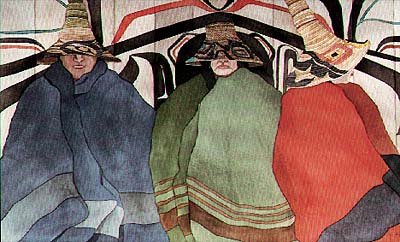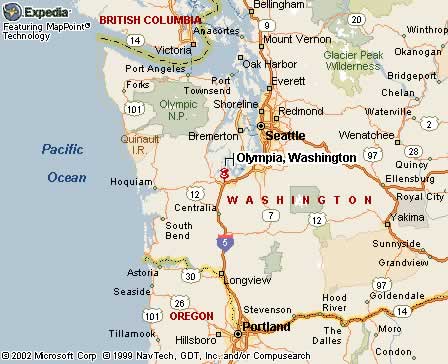|
|
Canku Ota |
|
|
(Many Paths) |
||
|
An Online Newsletter Celebrating Native America |
||
|
January 25, 2003 - Issue 79 |
||
|
|
||
|
State Urged to Allow Teaching of Tribal Languages in Schools |
||
|
by Sharon Michael, The
Bellingham Herald
|
||
|
credits: Art - "Haida Patterns" by Irene Klar |
|
More than 130 tribal representatives crowded into the board hearing room, offering a prayer song led by Lummi elder Pauline Hillaire to "clear the way" for a positive exchange of ideas before testimony began. What is at stake for the tribes is assurance that their languages and culture will be passed on to future generations. Fluent speakers are getting very old in many tribes, and in many others they have died. The tribes want the ability to certify tribal members - many who are elders - to teach languages and culture in the public schools at all levels. They have agreed to a three-year pilot program on which the board is scheduled to vote Friday. There is a possibility that the board will delay action while its staff completes research to make sure there is no conflict between what the board approves and the federal Leave No Child Behind Act. That measure requires that all classes taken for credit be taught by a "highly qualified" teacher. "Native teachers are highly qualified in the subjects they are teaching, but they are not state certified," said Bobbie May, board president. Kim Brewer, a former attorney for the Tulalip tribe, assured the board there is no conflict and urged the board to approve the pilot program and "not lose momentum." May, board president, says she has several people working on the issue and she hopes to have a clarification by Friday. "We would really like to get this program under way this fall," May said. "The potential for this is enormous. You can see what it has done for their self-esteem." Permitting tribal governments to establish individual certification standards would acknowledge and protect their sovereignty and state certification would give Indian culture and language teachers professional standing, say tribal leaders. Martina Whelshula a member of the Arrow Lakes Nation on the Colville reservation told the board that preserving native languages is essential to preserving culture and tradition. "Our language is a living language," Whelshula said. "Children are our hope for the future and our means to passing on our history, culture and language." Despite systematic attempts by the U.S. government, military and schools, native languages have survived, she said. "But our big challenge today is that the education system is in competition with our culture," Whelshula added. "I'm saying we are not only losing language, we are losing intellectual diversity." The pilot program would allow tribal governments to establish individual certification standards for their language and culture teachers. A bachelor's degree would not be required, but teachers would have to submit to a background check and take classes in child abuse, similar to other state-certified teachers. Hillaire closed the hearing by singing the Star Song and urging the board to act quickly. "Let's teach the whole child," she said. "For the generations gone by, it was debilitating to have the language removed. We have an opportunity now to uplift our people and those of you who have befriended us." Teaching native culture and languages in the public schools helps American Indian students succeed academically, said Denny Hurtado, state Indian education director. "Fifty to 80 percent of our kids drop out before high school graduation," Hurtado said. "Language and culture (education) will keep them in the system. Research shows language and culture (education) improves academic achievement of Indian kids." Nooksack language specialist Catalina Renteria says her goal is to eventually get Nooksack language classes into the public school system at all levels. "So the babies get to hear it," she said. Currently Lummi languages are being taught at Ferndale High School and Nooksack languages are being offered at Northwest Indian College.
|
|
|
||
|
|
||
| Canku Ota is a free Newsletter celebrating Native America, its traditions and accomplishments . We do not provide subscriber or visitor names to anyone. Some articles presented in Canku Ota may contain copyright material. We have received appropriate permissions for republishing any articles. Material appearing here is distributed without profit or monetary gain to those who have expressed an interest. This is in accordance with Title 17 U.S.C. section 107. | ||
|
Canku Ota is a copyright © 2000, 2001, 2002, 2003 of Vicki Lockard and Paul Barry. |
||
 |
 |
|
|
The "Canku Ota - A Newsletter Celebrating Native America" web site and its design is the |
||
|
Copyright © 1999, 2000, 2001, 2002, 2003 of Paul C. Barry. |
||
|
All Rights Reserved. |
||
 OLYMPIA
- Tribal elders from all corners of the state appeared before the Washington
State Board of Education on Wednesday to urge the board to act now to
approve a pilot program certifying American Indian language and culture
teachers.
OLYMPIA
- Tribal elders from all corners of the state appeared before the Washington
State Board of Education on Wednesday to urge the board to act now to
approve a pilot program certifying American Indian language and culture
teachers.